#Rumblr
Text
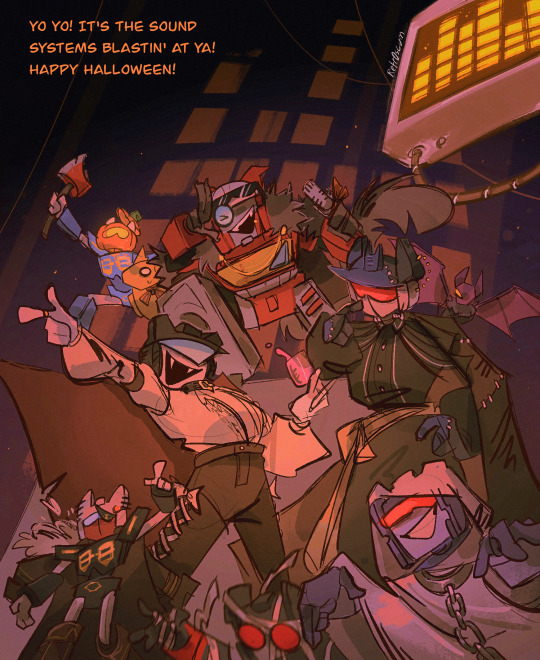
: Halloween party :
1K notes
·
View notes
Photo

mispelt tumblr and now im sobbing
#tumblr#rumblr#google#idk#shitpost#help#sobbing#tumblr but i get to deck you#imagine the bots#lindsey138 messages you a pic and the shows up at your door with boxing gloves#never going on the internet again
9 notes
·
View notes
Text
Idea: tumblr’s world pvp system gets quarantined on a new sister-site called Rumblr where it’s basically just craigslist for finding fistfights happening between fandoms or ships.
Sick of seeing wincest on your dash? Rumblr just showed you a a nice lil post from rumblr user samanddeanforever69420 over on 11th st in east Los Angeles punching a bunch of castiel cosplayers in the face and extended and open invite to anyone who thinks they can take on the ‘cest. You’re not going to stand for the ‘cest, are you??
#I accidentally typed r instead of t and my brain had a baby#I’m so tired#destiel#wincest#supernatural#shipping wars#rumblr#tumblr pvp#ideas#concept#someone write it
8 notes
·
View notes
Note
RUMBLES!!! I LOVE THAT IDEA!!
Thank you!! The comment to that post also had a good idea:
Rumblr.
Tumblr for cars.
I am really hoping this becomes a series because I am in love with this
8 notes
·
View notes
Text
The Mini Interview with Tajja Isen

By Allison Armijo
Tajja Isen and I were in the same eleventh grade English class. Just a few years apart. And in different countries–her, in Canada, me, in the US. But like many with an upbringing not dissimilar to the suburban worlds created by Raymond Carver, we both were aspiring writers who wanted to write like the ‘tiny white people,’ as Isen dubs them, that lived–and sometimes continue to live–in our heads.
Isen is a voice actor, writer, and the former editor-in-chief of Catapult magazine. Her work approaches this boundary between the physical and the linguistic–our actions and our words–with curiosity, that which makes space for the seemingly contradictory state of living and growing in a world with language and its debt, or the space between our values and actions.
Isen’s 2022 debut collection, Some of My Best Friends: Essays on Lip Service (Atria, 2024), looks at how the language of social justice activism has evolved over time: change without guarantee of progress, revision without redress (also known as ‘lip service’). Each essay combines research with cultural criticism and personal experience, asking questions about where the boundaries between the personal and political lie, and how the language used to navigate those spaces disproportionately affects people of color. By interrogating her own experiences within various American and Canadian institutions, Isen explores what happens when language becomes transactional, and how lip service diffuses this very necessary tension.
With the upcoming release of the paperback edition of Some of My Best Friends, I was delighted to chat with Isen over email about what it means to have a changing relationship to language, the importance of surprise (and self-love) in the writing process, and much more.
***
The Rumpus: The book opens with two epigraphs, one by W.E.B. Du Bois and another by Lana Del Rey, the first of which comes from The Souls of Black Folk, and the second from Instagram. Both approach the tokened: “I’m not racist, some of my best friends are Black,” in a different way. Do you think W.E.B. Du Bois would be a fan of the modes of activism through social media?
Tajja Issen: The book is extremely interested in how the language of social justice has changed over time, for better and worse. With these epigraphs, I wanted to highlight the opposite idea: How little things have changed. When I was reading The Souls of Black Folk, I was both disturbed and amused at how contemporary that particular moment of tokenization felt. [...] But I also don’t want to make sweeping generalizations about social media activism being bad or simplistic, especially now—I’m thinking of the way Palestinians have used it to document the ongoing genocide and asked us to bear witness and amplify the calls for a ceasefire, or the power of social platforms as tools of organizing in protest of those abuses. If somebody sat Du Bois down to explain that capacity to him, I bet he would be a fan.
Rumpus: How do you see language as a structure of resistance to bridge confession and storytelling? Were you resistant to any particular forms of framing or storytelling?
Isen: That’s a great question. Related to my hesitance to get personal in the book, I was resistant to a framing that writers of color often get cornered into, whether by their own impulses or, more commonly, by market pressures: to describe their identities as though racialized pain is the axis on which they spin. This is a story the publishing industry is very comfortable with and one that I wasn’t interested in telling. (Drama ensued!) But, to your question, that’s the whole point of language as a structure of resistance—to disrupt the comfortable, anesthetic modes of narrative and argument.
Rumpus: You mention in “Tiny White People” how when you were younger, you imitated popular white authors that “find ways to talk about race without really talking about it.” How do you see your own relationship to language developing over time?
Isen: When it comes to my approach to writing, I try to stay in a permanent state of surprise. Surprise is the goal and the dream state. With that essay in particular, the version of it I wrote for the book is very different from the version that was originally published in Electric Literature in 2017. By the time I sat down to update that essay for the book, I realized none of the original version was reusable. My thinking had changed too much. My politics had changed too much. “I need to feel seen” is the type of soundbite that’s super accessible and conforms to the mainstream version of racial discourse that is easy to market. It was more important to me to remain faithful to these confrontations with my own mind, however personally jarring or corporately inconvenient (lol), than to rehash what a predominantly white readership is already comfortable hearing.
Rumpus: What forms does revision take in your work? Do you see it as more of an emotional or technical endeavor?
Isen: I love the idea of a writer who can distinguish between the emotional and technical aspects of revision, but I’ve got to admit I’m just not that writer. A piece, a page, a book transforms many times before I stop evaluating it. If I had to boil my revision process down, I’m always subjecting the work to two questions. The other day, I described it to my husband as akin to knocking on a wall to find a stud: First knock—Is it true? Second knock—Is it interesting? I keep knocking, keep asking those two questions, until the quality of sound that echoes back to me meets my standards.
Rumpus: I love the way you physically map tactics of white femininity: innocent and deviant on the Y axis, tough and wounded along the X axis. You give various examples of the ways white femininity often evades racial consciousness out of a lack of obligation to acknowledge it. How, if at all, do you see aesthetics as an inherently political approach to conflict and compromise in predominantly white spaces?
Isen: I love that you frame aesthetics as “inherently political,” which they are, and which I think is easy for a lot of people to forget. We see the aesthetic-political split play out pretty literally in which artists get asked what questions—who gets asked about representation and identity versus who gets asked about craft choices. I’m far from the first to point this out. It was important to me, in that essay in particular, to stake out that territory and to remind the reader that aesthetics, especially in work by white (female) artists, can be a convenient way to make politics seem invisible.
Rumpus: In your last essay, “Dead or Canadian,” you mention Lee Edelman’s “God Bless the U.S.A.” I loved what you said about the song “[getting] its rocks off knowing that [you] overheard its pleasure.” This returns to ideas of spectacle and voyeurism in tokenized forms of representation that you explore throughout, but also introduces the idea of self-love in the personal address. Thinking about the relationship between language and the self, do you see self-love as a product of fluency–i.e., recognizing the ins and outs of lip service across fields and disciplines–or a rejection of it?
Isen: That’s an interesting distinction and not one I’d considered before. I guess, for me, I come into clearer focus for myself when I can name and isolate the forces that shape, constitute, and frustrate me. And that’s also what I hope the book gives to its readers: the aha moment where it names a dynamic or pattern that they’ve registered—this kind of insidious, comic creep of meaningless language—but haven’t necessarily found the words for. Articulating something long-felt but unexpressed is, I think, the best thing that writing can do. I like the notion that it might be a form of love, both for oneself and for others.
***
Allison Armijo is a creative writing student in Boston, MA.
1 note
·
View note
Text
Ok, what the fuck. Why is Tumblr unfollowing tags I followed? Now I gotta go back and refollow a lot of my faves.
@staff you got some explaining to do...
0 notes
Text
Updating WhatsApp, Tumblr, Instagram is ugly as fuckkk arghhghhjj
1 note
·
View note
Text


CM PUNK ☆ ROYAL RUMBLE 2024
28 notes
·
View notes
Text

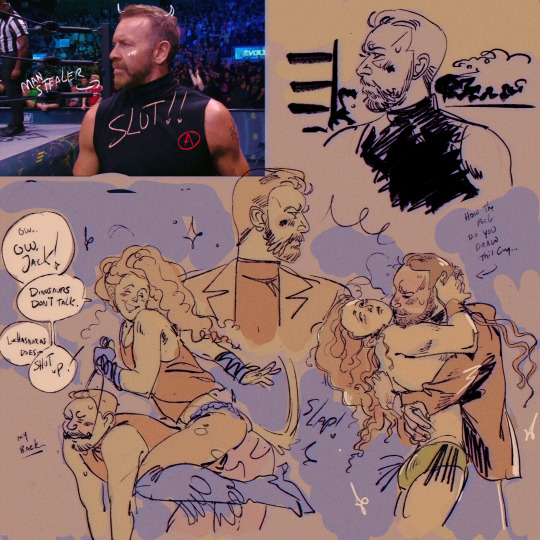

reposting these here too bc why not! plus a BONUS! currently into jurassic express..like i wonder how they all slept i assume they shared one rOOM
#art#augh#jungle boy#tagging this bc in retrospect theyre kINDA TAME RIGHT.. RIGHT..RIGHY.#ok last post bc im scared rumblr is gonan think im spyamminG#me arts
65 notes
·
View notes
Note
can you draw the cassettes? thanks!
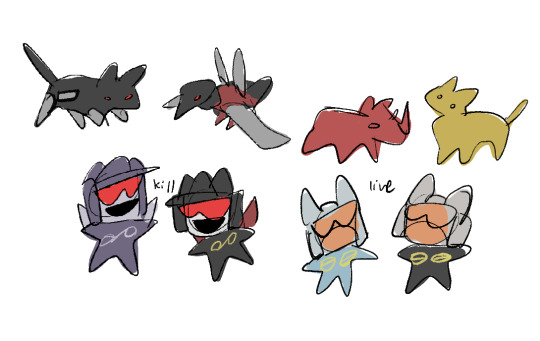
saying thanks without saying please? like a king? oh oh jail for anon, jail for anon for one thousand years
192 notes
·
View notes
Text
#Rtgame#Rtumblr#Rumblr Tumblr#I just bought Dorfromantik#Added it to my wishlist when he played it and it went on sale#I really like it
85 notes
·
View notes
Text
oh how a single typo can lead to beautiful discoveries
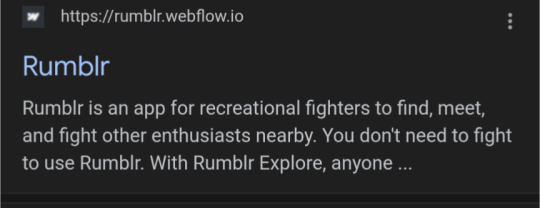
#petition that from now on all fandom fights get duked out irl#tumblr? more like RUMBLR#random boli thoughts
15 notes
·
View notes
Text

Oh.........buddy.....
#scum talks#mousette is just like :3#meanwhile gilbert is like *demonic noises*#i meant to post this like 3 hrs ago but i guess i never hit the Post button since i opened rumblr and there it was
30 notes
·
View notes
Text
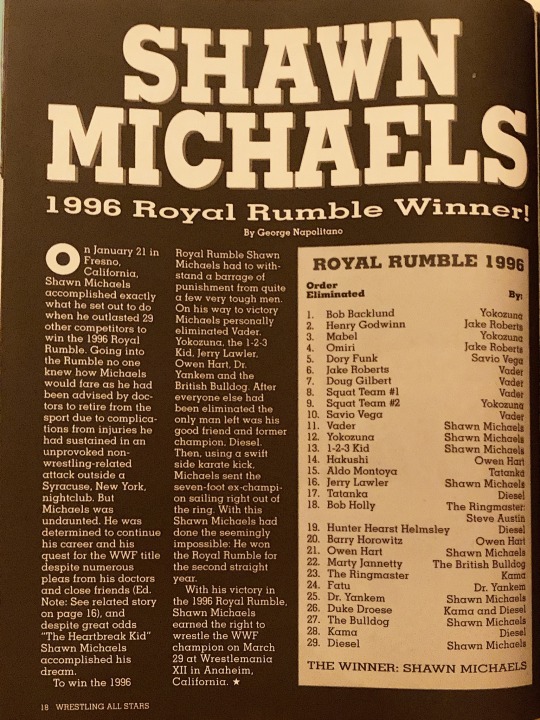
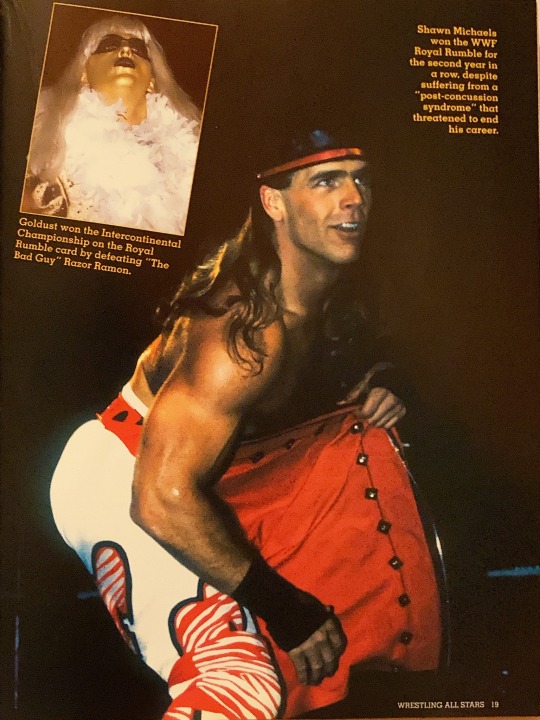
WRESTLING ALL STARS: Heroes and Villains : JUNE 1996
Shawn Michaels 1996 Royal Rumble Winner!
By George Napolitano
On January 21 in Fresno, California, Shawn Michaels accomplished exactly what he set out to do when he outlasted 29 other competitors to win the 1996 Royal Rumble. Going into the Rumble no one knew how Michaels would fare as he had been advised by doctors to retire from the sport due to complications from injuries he had sustained in an unprovoked non-wrestling-related attack outside a Syracuse, New York, nightclub. But Michaels was undaunted. He was determined to continue his career and his quest for the WWF title despite numerous pleas from his doctors and close friends (Ed. Note: See related story on page 16), and despite the great odds “The Heartbreak Kid” Shawn Michaels accomplished his dream.
To win the 1996 Royal Rumble Shawn Michaels had to withstand a barrage of punishment from quite a few very tough men. On his way to victory Michaels personally eliminated Vader, Yokozuna, the 1-2-3 Kid, Jerry Lawler, Owen Hart, Dr. Yankem and the British Bulldog. After everyone else had been eliminated the only man left was his good friend and former champion. Diesel. Then, using a swift side karate kick, Michaels sensent the seven- foot ex-champion sailing right out of the ring. With This Shawn Michaels had done the seemingly impossible: He won the Royal Rumble for the second straight year.
With his victory in the 1996 Royal RUmble, Shawn Michaels earned the right to wrestle the WWF champion on March 29 at Wrestlemania XII in Anaheim, California.
ROYAL RUMBLE 1996
Order Eliminated : By
Bob Backlund : Yokozuna
Henry Godwinn : Jake Roberts
Mabel : Yokozuna
Omiri : Jake Roberts
Dory Funk : Savio Vega
Jake Roberts : Vader
Doug Gilbert : Vader
Squat Team #1 : Vader
Squat Team #2 : Yokozuna
Savio Vega : Vader
Vader : Shawn Michaels
Yokozuna : Shawn Michaels
1-2-3 Kid : Shawn Michaels
Hakushi : Shawn Michaels
Aldo Montoya : Tatanka
Jerry Lawler : Shawn Michaels
Tatanka : Diesel
Bob Holly : The Ringmaster: Steve Austin
Hunter Hearst Helmsley : Diesel
Barry Horowitz : OWen Hart
Owen Hart : Shawn Michaels
Marty Jannetty : The British Bulldog
The Ringmaster : Kama
Fatu : Dr Yankem
Dr Yankem : Shawn Michaels
Duke Droese : Kame and Diesel
The Bulldog : Shawn Michaels
Kama : Diesel
Diesel : Shawn Michaels
[Goldust won the Intercontinental Championship on the Royal Rumble card by defeating “The Bad Guy” Razor Ramon.
Shawn Michaels won the WWF Royal Rumble for the second year in a row, despite suffering from a “post-concussion syndrome” that threatened to end his career.]
16 notes
·
View notes
Text

Rainy Day in Southern Italy
52 notes
·
View notes
Text

One time Jackson and Stiles were having a heated argument in the car and Jackson took Stiles's Warren Zevon tape out of the player and threw it out the window in a rage and Stiles looked him dead in the eyes and pulled out a second copy of that same tape and put it back in the player.
#teen wolf#sterek#derek hale#tyler hoechlin#jackson whittemore#colton haynes#stiles stilinski#mieczyslaw stiles stilinski#dylan o'brien#dylan obrien#source: thepalestrose rumblr
372 notes
·
View notes